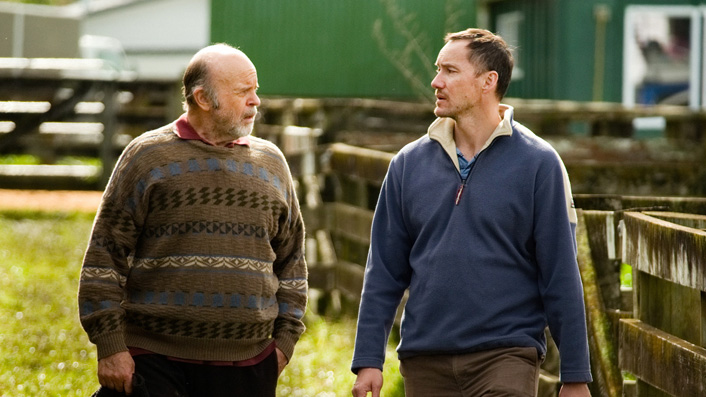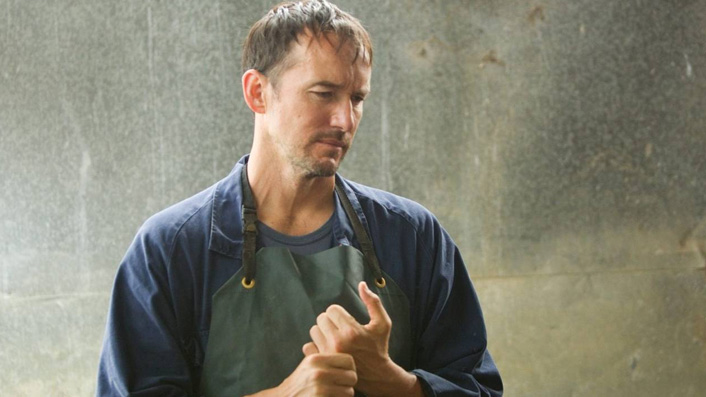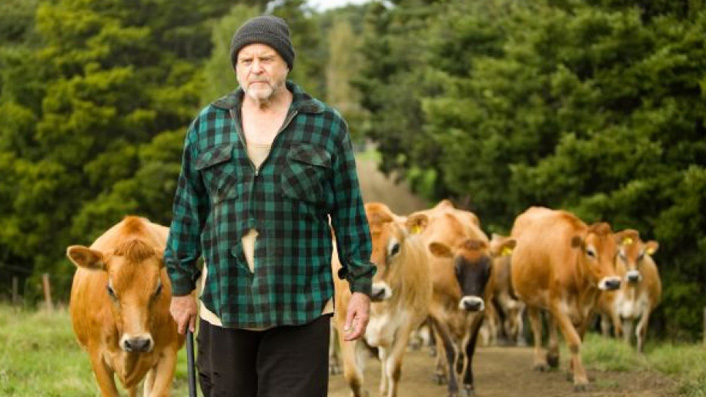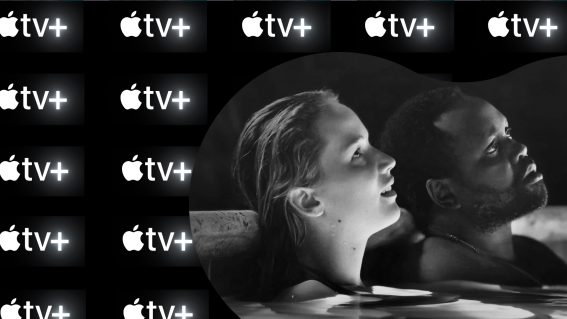How a teacher, a cow whisperer, and a farming community made NZ film Bellbird
The film is currently playing in cinemas.

Returning from successful runs at both the Sydney and New Zealand International Film Festivals, homegrown feature Bellbird is currently playing in select cinemas nationwide. Hamish Bennett’s feature debut takes place in the heart of a small New Zealand town, where a community comes together after a tragic death.
Having seen Bellbird twice now, it’s easy to see why Bennett made it. The film’s strength lies within the heart of the characters he’s crafted, the warmth of Kiwi community he observes, the sense of place he captures… it all comes across so effortlessly genuine, and that’s because he’s a local himself.
I talked to Bennett and star Cohen Holloway about the film, shooting it in his home town, and how useless exercises in farming looked great on camera.
FLICKS: Ross & Beth was your 2014 short film and Bellbird‘s an expansion of that, but was that always the intent with making a short film?
BENNETT: To be honest, it wasn’t necessarily the intent, but I think after we’d made Ross & Beth, it felt like that was a world that I wanted to continue exploring. And because I grew up in that area, and I had very, very fond memories of my childhood, I felt that it’s a world that I wanted to spend more time in.
My first short film was called The Dump, and that was filmed in the dump just down the road from where I grew up. So basically, what I’ve done is I’ve taken my only two ideas and combined them into one, and made Bellbird.
Were the extras played by locals?
BENNETT: Really proud to say that I know all of the extras. That was probably the real highlight for me of the whole filmmaking process was being able to go back to the community that, in many ways, inspired it and being able to go back and make it with them.
My parents are both teachers, and back up North, we’re surrounded by farmers. But my parents were very well respected in their community and we have really fond memories of our time up there. And in many ways, it feels like I’m riding on the coattails of the foundation they laid for me and my brothers because when I went back up there, they couldn’t have done more to help us, their community. I owed my mum and dad quite a lot for that.
The song Bellbird itself is quite central to the story. How did you land on that particular song?
BENNETT: Obviously, there’s the literal translation. That’s the song that Beth sings, and it is, in many ways, representative of Beth. To me, even though Beth’s not in the film for a long time, I really wanted her presence to be there for as long as possible, and thematically, the soundtrack that Karl Steven provided allowed us to keep that Bellbird tune sitting through there.
The other thing with the Bellbird is there’s a whakataki which sits underneath:
Hutia te rito o te harakeke. Kei hea te kōmako, e ko? He aha te mea nui o te Ao? He tāngata, he tāngata, he tāngata.
If you pluck the heart from the flax bush, where will the bellbird sing? And if you asked me, what’s the most important thing in the world? It’s people. It’s people. It’s people.
As much as that can be interpreted in different ways, for me, Beth was the heart of that family, and with her gone, there was no song. There was no light. And the idea of having people around them, that was the most important thing for them to have. So as much as that isn’t expressed right there on screen, it’s something that’s set underneath it the whole time.

Cohen, how much of your own experiences do you put into your character Bruce?
HOLLOWAY: I’ve never been a character like this before. As this poor man [Bennett] knows, I’m an eight coffees kind of person, really happy, bubbly all the time. So for me, it was really nice to find this soul that’s actually quite peaceful—a really beautiful, honest man. I really loved it.
BENNETT: You talk about how you became Bruce… Bruce’s character isn’t great at farming, and honestly, it wasn’t a stretch for him [Holloway] to do that. The first time he was shown how to milk a cow, by the end of it, he was just covered in shit. It was awesome because cows, they can sense when people are uncomfortable. And it makes them uncomfortable, and Cohen was absolutely uncomfortable.
HOLLOWAY: Their ears pull back.
BENNETT: Yeah. They didn’t like you. And you didn’t thoroughly enjoy it, but it really contributed because it made you look pretty uncomfortable in the shoot. It was awesome.
HOLLOWAY: And the other heart of the story is the elements—the farm, the cows, the setting. I keep calling it like a fine wine. The film lets you breathe in places where you go.
BENNETT: I was talking to a local farmer, and he said, “You’ll never see a farmer running.” The only time someone is running on a farm in this film is when something’s gone terribly wrong.
Again, it’s trying to be truthful to their world. It’s unfolding at the pace that I feel that life unfolds. So it was really important to not use quick cuts and jump around the place. Probably borrowed our editing style from Country Calendar.
The film punctuates the pace with all these natural, beautiful shots of cows. There’s an incredible shot of one cow that goes through the fence to get grass on the gravesite, and it’s almost like a visual summary of the film itself. Did you pick that from an enormous B-roll of lovely cows just doing stuff?
BENNETT: There’s a huge amount. Our cinematographer, Grant McKinnon, he’s from Te Aroha. He’s from their rural world, and he understands the humble beauty of these places. He brought so much of his own ability and his own sensibility to the film.
One thing we did have the luxury of doing is, on our third block, Grant and I went up about three days early, and because it was calving time, we basically just sat in paddocks and waited for things to happen.
HOLLOWAY: Was it an accident, then? The cow hanging by the gravesite or did you—?
BENNETT: That particular one wasn’t an accident. We had Carla, who’s the cow whisperer, put some feed through the other side of the fence—don’t want to give too much away—and she just kind of let them go for it. Those are her cows, and they love her.

The movie comes out at a pretty interesting time where, within New Zealand’s farming sector, things are starting to change, especially in regards to maintaining an environmentally sustainable future. If you had just started making this film or writing this film now, do you think anything would have changed?
BENNETT: No, I don’t think so. Regardless of how people stand politically on ethics around farming and things like that, I think ultimately, my focus was about these people and this community.
I know growing up in this community, my parents are both teachers, and I know probably politically, they were very much in the minority in the community we grew up in. But I also know that we had far more in common with the people around us than differences.
You could have different viewpoints on politics or on farming or whatever, but when you look past those things, there’s a real goodness and a real heart to places like that that certainly I know and I appreciate, and I know my parents were a big part of those people. So I think Bellbird is very much a film which is about looking at the things which, I suppose, talking about our similarities, as opposed to our differences.
HOLLOWAY: And around that was Marshall Napier, who plays my dad. He’s a vegan, so he was having an interesting sort of battle with the whole farming process as well. But he said it was a lot easier because they were dairy farmers.
BENNETT: Marshall did say, too, that it was a lot easier seeing the way the family are with their cows. And I think there’s a pretty big difference, I think, between small, family-run farms like the one we worked on, and the huge operation facilities.
Carla’s animals, they trace all the way back to the original animal, so each one of them has a name and they’re able to show the lineage of each of their cows. It’s that inherently close relationship that she has with her animals, which I think makes it easier for someone like Marshall easier for him because they treat their animals with a huge amount of respect.
Cohen, it was brought to my attention that Hamish destroyed you in a goal-kicking competition. Can you confirm this?
HAMISH BENNETT: Please talk about it at length.
COHEN HOLLOWAY: Hamish, I think, does have some experience with rep rugby. I was in my jandals and the goalpost was probably only 30 metres away, but it was windy, and I said, “I’ll drop kick this just once.” All the crew and everybody watched, and I got it over, and that’s where the rivalry started.
BENNETT: It was all downhill from there. That was your high point.
HOLLOWAY: Then we had a competition on the second-to-last day of shoot, I think. And you kicked in bare feet. Well, I decided to go bare feet too, and I think I kicked maybe one out of five—Bennett’s amazing—and then I sort of limped around for two days after that. Big, big blisters on my feet.
























